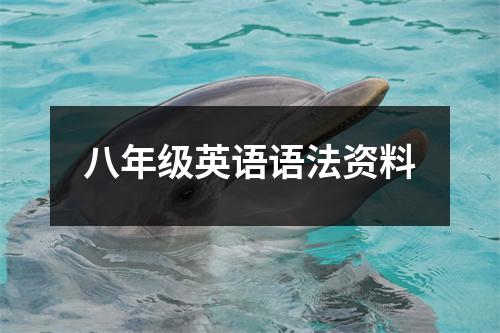八年级英语语法资料
- 文档
- 2024-10-09
- 154热度
- 0评论
以下是小编整理的八年级英语语法资料,本文共8篇,欢迎阅读分享,希望对大家有帮助。

不定代词和不定副词的`用法:
(1)左边的some、any、every、no与右边的body、one、thing构成不定代词,some、any、every、no与右边的疑问副词where构成不定副词;
(2)一般情况下以some开头的不定代词和不定副词用于肯定句,以any开头的不定代词和不定副词用于否定句、疑问句;以no开头的不定代词和不定副词表示否定含义(no one为两个单词);
(3)不定代词或不定副词和形容词连用时,形容词放在后面。
He has something important to do.他有重要的事情要做。(肯定句用something,形容词important放后)
Did you buy anything special? (一般疑问句用anything,形容词special放后)
Did you go anywhere interesting last month?上个月你去令人感兴趣的地方了吗?
(一般疑问句用不定副词anywhere,形容词interesting放后)
(4)不定代词和不定副词做主语时,后面的动词用单数形式。Everone is here today.今天每个人都在这里。
感叹句的类型:
⑴ What a∕an+adj+可数名词单数(+主语+谓语)!
What +adj+可数名词复数∕不可数名词(+主语+谓语)!
What a fine day (it is) !多么好的天啊! (day为可数名词单数)
What an interesting book it is !多么有趣的一本书啊!(book为可数名词单数)
What beautiful flowers they are !多么漂亮的花啊! (flowers为可数名词复数)
What bad weather it is!多么糟糕的天气啊!(weather为不可数名词)
⑵ How +adj +主语+(谓语中的)系动词! How +adv +主语+(谓语中的)实义动词!
How happy I am!我多麽高兴啊! (happy为adj,am为系动词)
How hard they are working !他们工作多么努力啊!(hard为adv,work为实义动词)
点拨:陈述句改为感叹句,可以采用“一判、二定、三移”。
一判:是判断出陈述句谓语动词后的中心词的词性(adj∕adv∕n);
二定:是根据判断出来的结果来确定引导词(中心词为名词用What;中心词为形容词或副词用How;)
三移:就是把主语和谓语移到后面。
注意:在感叹句中,不得出现so,very,very much等表示程度的单词。
例如:①Our school is beautiful .
一判:beautiful为形容词;二定:beautiful为形容词,用How来引导;三移:把Our school is移到How beautiful后面,即为感叹句How beautiful our school is!
②He is a clever boy.
一判:boy为名词;二定:boy为名词,用What来引导;三移:把He is移到What a clever boy后面,即为感叹句What a clever boy he is!
③He studies English well.
一判:well为副词;二定:well为副词,用How来引导;三移:把He studies移到How well后面,即为感叹句How well he studies!
练习:将下列句子变为感叹句。①The room is very bright.
② We live a happy life today. ③It is a nice present.
④This is difficult problem. ⑤She played the piano wonderfully.
1.the (best) way to do sth:做某事的方法
2.thanks for+名词V?ing:为什么而感谢
3.take a trip参加郊游,at the end of this month在本月底
4.go back to+地点:回到某地He will go back to Beijing in 2 days.两天后他将回北京。
5.have a surprise party for sb为某人举办一个惊喜的晚会
6.without+名词代词 V?ing:没有… He can't finish the work without our help.(help为名词)
He went to school without having breakfast.他没有吃早饭就去上学。(have为动词)
7.look forward to +名词代词V.ing:期待,盼望
8.hear from sb.收到某人的来信= receive a letter from sb.
9.the opening of…:开幕/开业
10.在具体哪一天的上午、下午、晚上用on,比较:
in the morning在早晨on Sunday morning在星期天的早晨
11.invite sb to +地点:邀请某人去某地(invite -- invitation ) invite sb to do sth邀请某人做某事
12.reply to sth / sb:回答某事/回答某人go shopping购物,do homework做家庭作业
八年级上册英语语法复习资料
一般现在时
1.概念:经常、反复发生的动作或行为及现在的某种状况。
2.时间状语: Always, usually, often, sometimes, every week (day, year, month…) , once a week(day, year, month…), on Sundays,
3.基本结构:动词 原形 (如主语为第三人称单数,动词上要改为第三人称单数形式)
4.否定形式:主语+am/is/are +not+其他; 此时态的谓语动词若为行为动 词,则在其前加dont, 如主语为第三人称单数,则用doesnt,同时还原行为动词。
5.一般疑问句:把be动词放于句首;用助动词do提问,如主语为第三人称单数,则用does,同时,还原行为动词。
6.例句:It seldom snows here.这里很少下雪。
He is always ready to help others.他总是乐于帮助别人。
Action speaks louder than words.事实胜于雄辩。
二、一般过去时
1.概念:过去某个时间里发生的动作或状态;过去习惯性、经常性的动作、行为。
2.时间状语:ago, yesterday, the day before yesterday, last week, last(year, night, month…), in 1989, just now, at the age of 5, one day, long long ago, once upon a time, etc.
3.基本结构:主语+动词或be的过去时+名词
4.否定形式:主语+was/were +not+其他;在行为动词前加didnt,同时还原行为动词。
5.一般疑问句:was或were放于句首;用助动词do的过去式did 提问,同时还原行为动词。
6.例句:She often came to help us in t hose days.那些天她经常来帮助我们。
I didnt know you were so busy.我不知道你是这么忙。
三、一般将来时
1.概念:表示将要发生的动作或存在的状态及打算、计划或准备做某事。
2.时间状语:Tomorrow, next day(week, month, year…),soon, in a few minutes, by…, the day after tomorrow, etc.
3.基本结构:主语+am/is/are +going to + do+其它;主语+will/shall + do+其它
4.否定形式:主语+am/is/are not going to do ;主语+will/shall not do+其它
5.一般疑问句:be放于句首;will/shall提到句首。
6.例句:They are going to have a competition with us in studies.他们将有一场比赛和我们一起研究。
It is going to rain.天要下雨了。
四、一般过去将来时
1.概念:立足于过去某一时刻,从过去看将来,常用于宾语从句中。
2.时间状语:The next day (morning, year…),the following month(week…),etc.
3.基本结构:主语+was/were +going to + do+其它;主语+would/should + do+其它
4.否定形式:主语+was/were+not + going to + do; 主语+would/should + not + do.
5.一般疑问句:was或were放于句首;would/should 提到句首。
6.例句:He said he would go to Beijing the next day.他说他第二天要去北京。
I asked who was going there.我问,谁要去那里。
五、现在进行时
1.概念:表示现阶段或说话时正在进行的动作及行为。
2.时间状语:Now, at this time, days, etc. look. listen
3.基本结构:主语+be +doing +其它
4.否定形式:主语+be +not +doing+其它
5.一般疑问句:把be动词放于句首。
6.例句:How are you feeling today?你今天感觉如何?
He is doing well in his lessons.在课上他表现得很好。
六、过去进行时
1.概念:表示过去某段时间或某一时刻正在发生或进行的行为或动作。 新$课$标$第$一$网
2.时间状语:at this time yesterday, at that time或以when引导的谓语动词是一般过去时的时间状语等。
3.基本结构 主语+was/were +doing +其它
4.否定形式:主语+was/were + not +doing+其它
5.一般疑问句:把was或were放于句首。(第一个字母大写)
6.例句:At that time she was working in a PLA unit.那段时间她在人民解放军部队工作。
When he came in, I was reading a newspaper.他进来时,我正在读报纸。
七、将来进行时
1.概念:表示将来某一时间正在进行的 动作,或表示要在将来某一时间开始,并继续下去的动作。常用来表示询问、请求等。
2.时间状语:Soon, tomorrow, this evening,on Sunday, by this time,in two days, tomorrow evening
3.基本结构:主语+shall/will + be +现在分词+其它
4.否定形式:主语+shall/will + not + be +现在分词+其它
5.例句:This time next day they will be sitting in the cinema.下一天的这个时间,他们正坐在电影院。
He won’t be coming to the party.他不去参加聚会了。
八、过去将来进行时
1.概念:表示就过去某一时间而言,将来某一时刻或某一段时间正在进行的动作,主要用于宾语从句中,尤其多用于间接引语中。
2.基本结构:should/would + be +现在分词
3.例句:They said they would be coming.他们说了他们将要来。
He said he could not com e because he would be having a meeting.他说他不能来因为要开会。
九、现在完成时
1.概念:过去发生或已经 完成的动作对现在造成的影响或结果,或从过去已经开始,持续到现在的动作或状态。
2.时间状语:yet,already,just,never,ever,so far,by now,since+时间点, for+时间段,recently, lately, in the past few years, etc.
3.基本结构:主语+have/has +p.p(过去分词)+其它
4.否定形式:主语+have/has + not +p.p(过去分词)+其它
5.一般疑问句:have或has。
6.例句:Ive written an article.我已经写了一篇论文。
The countryside has changed a lot in th e past few years.在过去的几年,农村发生了巨大的变化。
十、过去完成时
1.概念:以过去某个时间为标准,在此以前发生的动作或行为,或在过去某动作之前完成的行为,即“过去的过去”。
2.时间状语:Before, by the end of last year (term, month…), etc.
3.基本结构:主语+had + p.p(过去分词)+其它 4.否定形式:主语+had + not +p.p(过去分词)+其它
5.一般疑问句:had放于句首。
6.例句:As soon as we got to the station, the train had left.当我们到车站的时候,火车已经开走了。
By the end of last month. We had reviewed four books.到上个月底。我们有了四本书。
基本结构:主语+had+p.p(过去分词)+其它
①肯定句:主语+ had+p.p(过去分词)+其它
②否定句:主语+ had+ not+p.p(过去分词)+其它
③一般疑问句:Had+主语+p.p(过去分词)+其它
④特殊疑问句:特殊疑问词+一般疑问句
十一、将来完成时
1.概念:在将来某一时刻之前开始的动作或状态
2.时间状语:by the time of; by the end of+时间短语( 将来);by the time+从句(将来)
3.基本结构:主语+be going to/will/shall + have+p.p(过去分词)+其它
4例句:By the time you get back, great changes will have taken place in this area.到你回来的时候,就将发生巨大的变化。
十二、过去将来完成时
1.概念:表示在过去某一时间对将来某一时刻以前所 会发生的动作,常用在虚拟语气中,表示与过去的事实相反。
2.基本结构:should/would have done sth.
3.例句:I thought youd have left by this time.我想这会儿你已经走了。
He told them he would have finished it by 8 oclock.他告诉他们他会在8点以前干完。
十三、现在完成进行时
1.概念:表示从过去某一时间开始一直延续到现在的动作。这一动作可能刚刚开始,也可能仍在继续,并可能延续到将来。
2.基本结构:主语+have/has +been +doing+其它
3.时间状语:since+时间点,for+时间段等。
4.例子:I have been sitting here for an hour.我已经在这里坐了一个小时。
The children have been watching TV since six oclock.从6点起,孩子们一直看电视。
十四、过去完成进行时
1.概念:表示某个正在进行的动作或状态,持续到过去某个时刻,还未完成,一直持续到之后的当前才结束。
2.基本结构:主语+ had + been + doing +其它
3.例子:She had been suffering from a bad cold when she took the exam.她在考试之前一直患重感冒。
Had they been expecting the news for some time?他们期待这个消息有一段时间了吧?
4.特殊含义:①尚未完成:He had been writing the novel.他已经在写小说了。(他没写完)
②企图:He had been studying the meaning of this proverb.他曾经学习过这个谚语。(他曾努力学习过它)
③未得结果:We had been studying what our enemy had said.我们一直致力于敌人所说的。(但是我们没有理解)
④最近情况:He had been quarrellin g with his wife.他和他的妻子吵了一场架。(最近)
⑤反复动作:He had been asking me the same question.他一直问我相同的问题。(屡次)
⑥情绪:What had he been doing?他做了什么?(不耐烦)
十五、将来完成进行时
1.概念:表示动作从某一时间开始一直延续到将来某一时间。是否继续下去,要视上下文而定。
2.基本结构:shall/will have been doing
3.例子:I shall have been working here in this factory for twenty years by the end of the year.到今年年底,我将在这个工厂工作了。
If we dont hurry up the store will have been closing before we get t here. 咱们如不快一点儿,等我们到了那儿,店门就会关了。
十六、过去将来完成进行时
1.概念:表示从过去某时看至未来某时以前会一直在进行的动作。
2.基本结构:should/would + have + been +现在分词
3.例子:He told me that by the end of the year he would have been living there for thirty years.他告诉 我,到年底时,他就在那住了30年了。
(1)“甲+be+(倍数)+形容词比较级+than+乙”表示“甲比乙…”或“甲比乙…几倍”。
Tom is taller than Kate.
汤姆比凯特高。
This room is three times bigger than that one.
这个房间比那个大三倍。
(2)“甲+实意动词+(倍数)+副词比较级+than+乙”表示“甲比乙…”或“甲比乙…几倍”。
I got up earlier than my mother this morning.
我今天早晨起床比我妈妈还早。
He runs three times faster than his brother.
他跑的速度比他弟弟快三倍。
感叹句的类型:
⑴ What a∕an+adj+可数名词单数 (+主语+谓语)!
What +adj+可数名词复数∕不可数名词 (+主语+谓语)!
What a fine day (it is) !多么好的天啊! (day为可数名词单数)
What an interesting book it is !多么有趣的一本书啊!(book为可数名词单数)
What beautiful flowers they are !多么漂亮的花啊! (flowers为可数名词复数)
What bad weather it is!多么糟糕的天气啊!(weather为不可数名词)
⑵ How +adj +主语+(谓语中的)系动词! How +adv +主语+(谓语中的)实义动词!
How happy I am!我多麽高兴啊! (happy为adj,am为系动词)
How hard they are working !他们工作多么努力啊!(hard为adv,work为实义动词)
点拨:陈述句改为感叹句,可以采用“一判、二定、三移”。
一判:是判断出陈述句谓语动词后的中心词的词性(adj∕adv∕n);
二定:是根据判断出来的结果来确定引导词(中心词为名词用What;中心词为形容词或副词用How;)
三移:就是把主语和谓语移到后面。
注意:在感叹句中,不得出现so,very,very much等表示程度的单词。
例如:①Our school is beautiful .
一判:beautiful为形容词;二定:beautiful为形容词,用How 来引导;三移:把Our school is移到How beautiful后面,即为感叹句How beautiful our school is!
②He is a clever boy.
一判:boy为名词;二定:boy为名词,用What来引导;三移:把He is移到What a clever boy 后面,即为感叹句What a clever boy he is!
③He studies English well.
一判:well为副词;二定:well为副词,用How 来引导;三移:把He studies移到How well后面,即为感叹句How well he studies!
练习:将下列句子变为感叹句。①The room is very bright.
② We live a happy life today. ③It is a nice present.
④This is difficult problem. ⑤She played the piano wonderfully.
1.the (best) way to do sth:做某事的方法
2.thanks for+名词V?ing:为什么而感谢
3.take a trip参加郊游,at the end of this month在本月底
4.go back to+地点:回到某地 He will go back to Beijing in 2 days.两天后他将回北京。
5.have a surprise party for sb为某人举办一个惊喜的晚会
6.without+名词代词 V?ing:没有… He can't finish the work without our help.(help为名词)
He went to school without having breakfast.他没有吃早饭就去上学。(have为动词)
7.look forward to +名词代词V.ing:期待,盼望
8.hear from sb.收到某人的来信 = receive a letter from sb.
9.the opening of… :开幕/开业
10.在具体哪一天的上午、下午、晚上用on,比较:
in the morning在早晨 on Sunday morning在星期天的早晨
11.invite sb to +地点:邀请某人去某地(invite -- invitation ) invite sb to do sth 邀请某人做某事
12.reply to sth / sb:回答某事/回答某人 go shopping 购物,do homework做家庭作业
学习一般将来时will do sth。
一般将来时由“助动词will / shall + 动词原型”构成,表示将来某个时间要发生的动作或存在的状态,常与表示将来的时间状语如tomorrow、next week,in 2 days(2天之后)等连用。(Shall用于第一人称,will可以用于各种人称。) (will not= won't)
一般疑问句:把肯定句中的will 提到句首即可。以上两句的一般疑问句为:
Will you visit the old man next week? Yes,we will.No, we won't .
否定句:把肯定句中的will 变为won't即可。以上两句的否定句为:
We won't visit the old man next week. She won't finish the work in 2 weeks.
不定代词和不定副词的用法:
(1)左边的some、any、every、no与右边的body、one、thing构成不定代词,some、any、every、no与右边的疑问副词where构成不定副词;
(2)一般情况下以some开头的不定代词和不定副词用于肯定句,以any开头的不定代词和不定副词用于否定句、疑问句;以no开头的不定代词和不定副词表示否定含义(no one为两个单词);
(3)不定代词或不定副词和形容词连用时,形容词放在后面。
He has something important to do.他有重要的事情要做。(肯定句用something,形容词important放后)
Did you buy anything special? (一般疑问句用anything,形容词special放后)
Did you go anywhere interesting last month?上个月你去令人感兴趣的地方了吗?
(一般疑问句用不定副词anywhere,形容词interesting放后)
(4)不定代词和不定副词做主语时,后面的动词用单数形式。Everone is here today.今天每个人都在这里。
1. what 与 which 都是疑问代词,都可以指人或事物,但是what仅用来询问职业。如:
What is your father? 你父亲是干什么的?
该句相当于:
What does your father do?
What is your father's job?
Which 指代的是特定范围内的某一个人。如:
---Which is Peter? 哪个是皮特?
---The boy behind Mary. 玛丽背后的那个男孩。
2. What...?是泛指,所指的事物没有范围的限制;而 Which...?是特指,所指的事物有范围的限制。如:
What color do you like best? (所有颜色)
你最喜爱什么颜色?
Which color do you like best, blue, green or yellow? (有特定的范围) 你最喜爱哪一种颜色?
3. what 与 which 后都可以接单、复数名词和不可数名词。如: Which pictures are from China?
哪些图片来自中国?
4) 频度副词的位置
1.常见的频度副词有以下这些:
always(总是,一直)
usually(通常)
often(常常,经常)
sometimes(有时候)
never(从不)
2.频度副词的位置:
a.放在连系动词、助动词或情态动词后面。如:
David is often arrives late for school.
大卫上学经常迟到。
b.放在行为动词前。如:
We usually go to school at 7:10 every day.
我们每天经常在7:10去上学。
c.有些频度副词可放在句首或句尾,用来表示强调。如:
Sometimes I walk home, sometime I rides a bike.
有时我步行回家,有时我骑自行车。
3.never放在句首时,主语、谓语动词要倒装。如:
Never have I been there.
5) every day 与 everyday
1. every day 作状语,译为“每一天”。如:
We go to school at 7:10 every day.
我们每天7:10去上学。
I decide to read English every day.
我决定每天读英语。
2. everyday 作定语,译为“日常的”。
She watches everyday English on TV after dinner.
她晚饭后在电视上看日常英语。
What's your everyday activity?
你的日常活动是什么?
6) 什么是助动词
1.协助主要动词构成谓语动词词组的词叫助动词(Auxiliary Verb)。被协助的动词称作主要动词(Main Verb)。
助动词自身没有词义,不可单独使用,例如:
He doesn't like English. 他不喜欢英语。
(doesn't是助动词,无词义;like是主要动词,有词义)
2.助动词协助主要动词完成以下功用,可以用来:
a. 表示时态,例如:
He is singing. 他在唱歌。
He has got married. 他已结婚。
b. 表示语态,例如:
He was sent to England. 他被派往英国。
c. 构成疑问句,例如:
Do you like college life? 你喜欢大学生活吗?
Did you study English before you came here?你来这儿之前学过英语吗?
d. 与否定副词not合用,构成否定句,例如:
I don't like him. 我不喜欢他。
e. 加强语气,例如:
Do come to the party tomorrow evening. 明天晚上一定来参加晚会。 He did know that. 他的确知道那件事。
3.最常用的助动词有:be, have, do, shall, will, should, would
7) forget doing/to do与remember doing/to do
1.forget to do 忘记要去做某事。 (未做)
forget doing 忘记做过某事。 (已做)
The light in the office is still on. He forgot to turn it off.
办公室的灯还在亮着,它忘记关了。(没有做关灯的动作)
He forgot turning the light off.
他忘记他已经关了灯了。 ( 已做过关灯的动作)
Don't forget to come tomorrow.
别忘了明天来。 (to come动作未做)
1.主语的第三人称单数形式,即可用“he, she, it”代替的。如: he, she, it
my friend, his teacher, our classroom, Tom, Mary's uncle
2.名词有单数名词和复数名词。如:
man(单数)---men(复数) banana(单数)---bananas(复数)
3.动词有原形,第三人称单数形式,-ing分词,过去式,过去分词。如: go---goes---going---went---gone
work---works---working---worked---worked
watch---watches---watching---watched---watched
当主语为第三人称单数的时候,谓语动词必须用相应的第三人称单数形式。如:
The boy wants to be a sales assistant.
Our English teacher is from the US.
Their daughter makes her breakfast all by herself.
1.主语的第三人称单数形式,即可用“he, she, it”代替的。如: he, she, it
my friend, his teacher, our classroom, Tom, Mary's uncle
2.名词有单数名词和复数名词。如:
man(单数)---men(复数) banana(单数)---bananas(复数) 3.动词有原形,第三人称单数形式,-ing分词,过去式,过去分词。如: go---goes---going---went---gone
work---works---working---worked---worked
watch---watches---watching---watched---watched
当主语为第三人称单数的时候,谓语动词必须用相应的第三人称单数形式。如:
The boy wants to be a sales assistant.
Our English teacher is from the US.
Their daughter makes her breakfast all by herself.
1) leave的用法
1.“leave+地点”表示“离开某地”。例如:
When did you leave Shanghai?
你什么时候离开上海的?
2.“leave for+地点”表示“动身去某地”。例如:
Next Friday, Alice is leaving for London.
下周五,爱丽斯要去伦敦了。
3.“leave+地点+for+地点”表示“离开某地去某地”。例如:
Why are you leaving Shanghai for Beijing?
你为什么要离开上海去北京?
2) 情态动词should“应该”学会使用
should作为情态动词用,常常表示意外、惊奇、不能理解等,有“竟会”的意思,例如:
How should I know? 我怎么知道?
Why should you be so late today? 你今天为什么来得这么晚?
should有时表示应当做或发生的事,例如:
We should help each other.我们应当互相帮助。
我们在使用时要注意以下几点:
1. 用于表示“应该”或“不应该”的概念。此时常指长辈教导或责备晚辈。例如:
You should be here with clean hands. 你应该把手洗干净了再来。
2. 用于提出意见劝导别人。例如:
You should go to the doctor if you feel ill. 如果你感觉不舒服,你去看医生。
3. 用于表示可能性。should的这一用法是考试中常常出现的考点之一。例如:
We should arrive by supper time. 我们在晚饭前就能到了。
She should be here any moment. 她随时都可能来。
八年级英语语法汇总
一. 形容词/副词的比较级和最高级
1. 形容词/副词的比较级和最高级的构成规则
(1)单音节词和少数以-er,-ow结尾的双音节单词,比较级在后面加-er,最高级在后面加-est。
① 单音节单词
small→smaller→smallest
short→shorter→shortest
tall→taller→tallest
great→greater→greatest
② 少数以-er,-ow结尾的双音节单词
clever→cleverer→cleverest
narrow→narrower→narrowest
(2)以不发音e结尾的单音节单词,比较级在原形后加-r,最高级在原级后加-st。
large→larger→largest
nice→nicer→nicest
able→abler→ablest
(3)以一个辅音字母结尾的闭音节(即:辅音+元音+辅音)单词中,先双写末尾的辅音字母,比较级加-er,最高级加-est。
big→bigger→biggest
hot→hotter→hottest
fat→fatter→fattest
(4)以“辅音字母+y”结尾的双音节词, 把y改为i,比较级加-er,最高级加-est。
easy→easier→easiest
heavy→heavier→heaviest
busy→busier→busiest
happy→happier→happiest
(5)其他双音节词和多音节词,比较级在前面加more,最高级在前面加most。
beautiful→more beautiful→most beautiful
different→more different→most different
easily→more easily→most easily
(6)有少数形容词、副词的比较级和最高级是不规则的,必须熟记。
good→better→best
well→better→best
bad→worse→worst
ill→worse→worst
old→older/elder→oldest/eldest
many/much→more→most
little→less→least
far →further/farther→ furthest/farthest
2. 形容词和副词比较级的用法
(1)“甲+be+(倍数)+形容词比较级+than+乙”表示“甲比乙…”或“甲比乙…几倍”。
Tom is taller than Kate.
汤姆比凯特高。
This room is three times bigger than that one.
这个房间比那个大三倍。
(2)“甲+实意动词+(倍数)+副词比较级+than+乙”表示“甲比乙…”或“甲比乙…几倍”。
I got up earlier than my mother this morning.
我今天早晨起床比我妈妈还早。
He runs three times faster than his brother.
他跑的速度比他弟弟快三倍。
3. 形容词和副词最高级的用法
(1)“主语+be+the+形容词最高级(+单数名词)+in/of...”表示“……是……中最……的”。
Tom is the tallest in his class./of all the students.
汤姆是他们班上/所有学生当中最高的。
This apple is the biggest of the five.
这个苹果是五个当中最大的。
(2)“主语+实意动词+(the)+副词最高级+in/of...”表示“……是……中最……的”。
I jump (the) farthest in my class.
我是我们班跳得最远的。
二. 句子成分
1.主语:句子所陈述的对象。
2.谓语:主语发出的动作。一般是有动作意义的动词。
3. 宾语:分为动词宾语和介词宾语,属于动作的承受者。
4. 系动词:表示状态或状态变化的动词,没有实际的动作意义。如 be, 感官系动词(look, sound, smell, taste 和 feel)、保持类系动词(keep, stay 和 remain)、状态变化类系动词(become、get、turn 和 go)等。
5. 表语:紧跟系动词后面的成分。
6. 定语:修饰名词或代词的成分。
7. 状语:修饰形容词、副词、动词或句子的成分。
8. 补语:分为宾语补足语和主语补足语。是对宾语和主语的补充说明,与其有主动或被动的逻辑关系。
例如:You should keep the room clean and tidy.
你应该让屋子保持干净整洁。
(You是主语, should keep是谓语,the room是宾语,clean and tidy是宾语补足语。)
This kind of food tastes delicious.
这种食物吃起来很可口。
(This kind of food是主语, tastes是系动词, delicious是表语。)
注意:主语、谓语、宾语、系动词、表语、补语是一个句子的主干成分;定语和状语是一个句子的修饰性成分,不是主干成分。
三. 句子类型
1. 简单句的基本形式是由一个主语加一个谓语构成。
2. 复合句由一个主句和一个或一个以上的从句构成。
3. 两个或两个以上的简单句用并列连词连在一起构成的句子,叫做并列句,其基本结构是“简单句+并列连词+简单句”。
四. 简单句的五种基本句型
1.“主语 + 谓语”(即“主谓”句型)
例:They arrived in Harbin yesterday morning.
分析:“they”(主语)“arrived”(谓语)。
2.“主语 + 谓语 + 宾语”(即“主谓宾”句型)
例:I study English.
分析:“I”(主语)“study”(谓语动作)“English”(宾语即动作涉及的对象)。
3.“主语 + 谓语 + 间接宾语 + 直接宾语”(即“主谓双宾”句型)
例:Our teacher taught us English.
分析:“our teacher”(主语)“教”(谓语动作)“us”(间接宾语)“English”(直接宾语)。
4.“主语 + 谓语 + 宾语 + 宾语补足语”(即“主谓宾宾补”句型)
例:He asked her to go there.
分析:“he”(主语)“asked”(谓语动作)“her”(宾语即动作涉及的对象)“to go there”(补语—补充说明宾语做什么)。
5.“主语 + 系动词+ 表语”(即“主系表”句型)
常用的系动词有be, keep,lie, remain, stand, become, fall, get, go, grow, turn, look, feel, seem, smell, sound, taste, 等。
例:I am a teacher. 我是一名老师
分析:“I”(主语)“am”(系动词)“a teacher”(表语—即表明主语的身份)。
五. 宾语从句
1. 宾语从句的含义
在主句中做宾语的从句叫做宾语从句。
如:She knew that the teacher had seen the film.
她知道这位老师看过这部电影。
“that the teacher had seen the film”做 knew 的宾语,同时又是由连接词 that 引导的从句,所以它叫做宾语从句。
2. 宾语从句的分类
(1)动词宾语从句:顾名思义,它是位于动词后面的宾语从句。
如:He asked whose handwriting was the best in our class.他问我们班上谁的书法最好。
(2)介词宾语从句:顾名思义,它是位于介词后面的宾语从句。
如:I agree with what you said just now.我同意你刚才说的话。
(3)形容词宾语从句:顾名思义,它是位于形容词后面的宾语从句。
如:I am afraid that I will be late. 恐怕我要迟到了。
3. 引导名词性从句的连接词
(1)that:没有含义,在宾语从句中不做成分
(2)whether/if:表示是否,在宾语从句中不做成分。
I don't know if /whether he still lives here after so many years. 我不知道这么多年后,他是否还住在这里。
(3)连接代词:what, which, who, whom, whose(在宾语从句中做主、宾、表和定语)
连接副词:where, when, how, why(在宾语从句中做状语)
The small children don't know what is in their stockings.(what 在宾语从句中做主语)
这些小孩子不知道什么在他们的长筒袜里。
Could you tell me why you were late for the meeting this morning?(why 在宾语从句中做原因状语)
你能告诉我为什么你今天早上开会迟到吗?
4. 在做宾语从句的题目时应注意两点
(1)时态:
①当主句是现在时态时,宾语从句可以根据需要使用任何时态。
I don't know when he will come back.我不知道他将何时回来。
He tells me that his sister came back yesterday.他告诉我他姐姐昨天回来了。
②当主句是过去时态时,宾语从句必须是一种过去的时态。
She asked me if I knew whose pen it was.她问我是否知道这是谁的钢笔。
He said that he could finish his work before supper.他说他会在晚饭前完成工作。
③当表示客观事实或普遍真理的句子做宾语从句时,任何时候都用一般现在时。
The teacher said that the earth goes round the sun.老师说过地球绕着太阳转。
(2)语序:任何从句都使用陈述句语序,宾语从句当然也不例外。
六. 一般现在时
一般现在时表示经常性、习惯性的动作,或表示现在的特征、状态。
当主语是非第三人称单数时,行为动词的一般现在时变化形式(见下表)。如:
当主语是第三人称单数时,行为动词一般现在时的句型变化如下表:
七. 现在进行时
现在进行时表示此时此刻正在发生的事情。常与now,at the moment,look,listen等词连用。
The little boy is watching TV now.
这个小男孩现在正在看电视。
Listen!She is playing the guitar in the next room.
听!她正在隔壁房间弹吉他。
现在进行时的基本结构:
肯定式:am/is/are+doing(现在分词)
否定式:am/is/are not +doing(现在分词)
一般疑问式:Am/Is/Are + 主语 +doing(现在分词)+ 其他
特殊疑问式:特殊疑问词+一般疑问式
They’re having a meeting now.
他们现在正在开会。
They aren't having a meeting now.
他们现在没有在开会。
Are they having a meeting now?
他们现在正在开会吗?
What are they doing now?
他们现在正在做什么?
八. 一般过去时
一般过去时表示在过去某个时间所发生的动作或所处的状态(与现在无关) 。常与yesterday, last week, in 1989, just now, a moment ago, the other day等过去具体时间状语连用。
He was here just now.
他刚才还在这里。
What did you do yesterday?
你昨天做了什么事?
一般过去时基本结构
1. 肯定句形式:主语+动词过去式+其他
I was an English teacher one year ago.
一年前我是一名英语老师。
I bought a yellow dress yesterday afternoon.
昨天下午我买了一条黄裙子。
2. 否定句形式:①was/were+not; ②在行为动词前加didn't,同时还原行为动词
I wasn't an English teacher one year ago.
一年前我不是一名英语老师。
I didn't buy a yellow dress yesterday afternoon.
昨天下午我没买一条黄裙子。
3. 一般疑问句:①was/were提到句首;②Did+主语+动词原形+其他?
Were you an English teacher one year ago?
一年前你是一名英语老师吗?
Did you buy a yellow dress yesterday afternoon?
昨天下午你买了一条黄裙子吗?
4. 特殊疑问句:特殊疑问词+一般疑问句
What were you one year ago?
一年前你是做什么的?
九. 一般将来时
一般将来时表示将来某个时间要发生的动作或状态,或将来经常发生的动作或状态。
一般将来时的基本结构
1. will+动词原形
否定式:will not=won't
一般疑问式:will+主语+动词原形+其他?
特殊疑问式:特殊疑问词+一般疑问式?
I will do a better job next time.
下次我要做得好些。
Oil and water will not mix.
油和水没法混在一起。
2. am/is/are going to +动词原形
否定式:am/is/are not going to +动词原形
一般疑问式:am/is/are +主语+ going to + 动词原形+其他?
特殊疑问式:特殊疑问词+一般疑问式?
He is going to spend his holidays in London.
他打算在伦敦度假。
Look at the dark clouds. There is going to be a storm.
看那乌云,快要下雨了。
Is he going to collect any data for us?
他会帮我们收集数据吗?
What are you going to do tomorrow?
明天你打算做什么?
十. 情态动词
can(能,会),may(可以,可能,也许),must(必须,一定,应该) have to(必须,不得不)
1. 肯定句结构:主语+can/may/must+动词原形+其它,例如
I must go now.
2. 否定句结构: 在can/may/must后加not,例如:
You mustn’t talk aloud in the library.
3. 一般疑问句结构: 把can/may/must提在主语前,例如:
Must you go now? (Yes, I must. No, I needn’t.)
May I open the window? (Yes, you may. No, you needn’t.)
十一. had better用法
had better+动词原形表示“最好做……”,变否定句时在had better后加not。例如:
You had better catch a bus.
You’d better not catch a bus. (You had= You’d )
十二. 特殊疑问句的变换
对划线部分提问时,将划线部分去掉,剩下部分变一般疑问句语序。(对主语提问例外)例如:
My name is Lily. What’s your name?
The river is 500 kilometres. Hong long is the rive.
1.“leave+地点”表示“离开某地”。例如: When did you leave Shanghai? 你什么时候离开上海的?
2.“leave for+地点”表示“动身去某地”。例如:
Next Friday, Alice is leaving for London. 下周五,爱丽斯要去伦敦了。
3.“leave+地点+for+地点”表示“离开某地去某地”。例如:
Why are you leaving Shanghai for Beijing?你为什么要离开上海去北京?
2) 情态动词should“应该”学会使用
should作为情态动词用,常常表示意外、惊奇、不能理解等,有“竟会”的意思,例如:
How should I know? 我怎么知道?
Why should you be so late today? 你今天为什么来得这么晚?
should有时表示应当做或发生的事,例如:We should help each other.我们应当互相帮助。
我们在使用时要注意以下几点:
1. 用于表示“应该”或“不应该”的概念。此时常指长辈教导或责备晚辈。例如: You should be here with clean hands. 你应该把手洗干净了再来。
2. 用于提出意见劝导别人。例如:
You should go to the doctor if you feel ill. 如果你感觉不舒服,你最好去看医生。
3. 用于表示可能性。should的这一用法是考试中常常出现的考点之一。例如: We should arrive by supper time. 我们在晚饭前就能到了。
She should be here any moment. 她随时都可能来。
3) What...? 与 Which...?
1. what 与 which 都是疑问代词,都可以指人或事物,但是what仅用来询问职业。如: What is your father? 你父亲是干什么的?
该句相当于:
What does your father do?
What is your father's job?
Which 指代的是特定范围内的某一个人。如:---Which is Peter? 哪个是皮特? ---The boy behind Mary. 玛丽背后的那个男孩。
2. What...?是泛指,所指的事物没有范围的限制;而 Which...?是特指,所指的事物有范围的限制。如:
What color do you like best? (所有颜色) 你最喜爱什么颜色?
Which color do you like best, blue, green or yellow? (有特定的范围) 你最喜爱哪一种颜色?
3. what 与 which 后都可以接单、复数名词和不可数名词。如: Which pictures are from China? 哪些图片来自中国?
★
★
★
★
★
★
★
★
★
★



